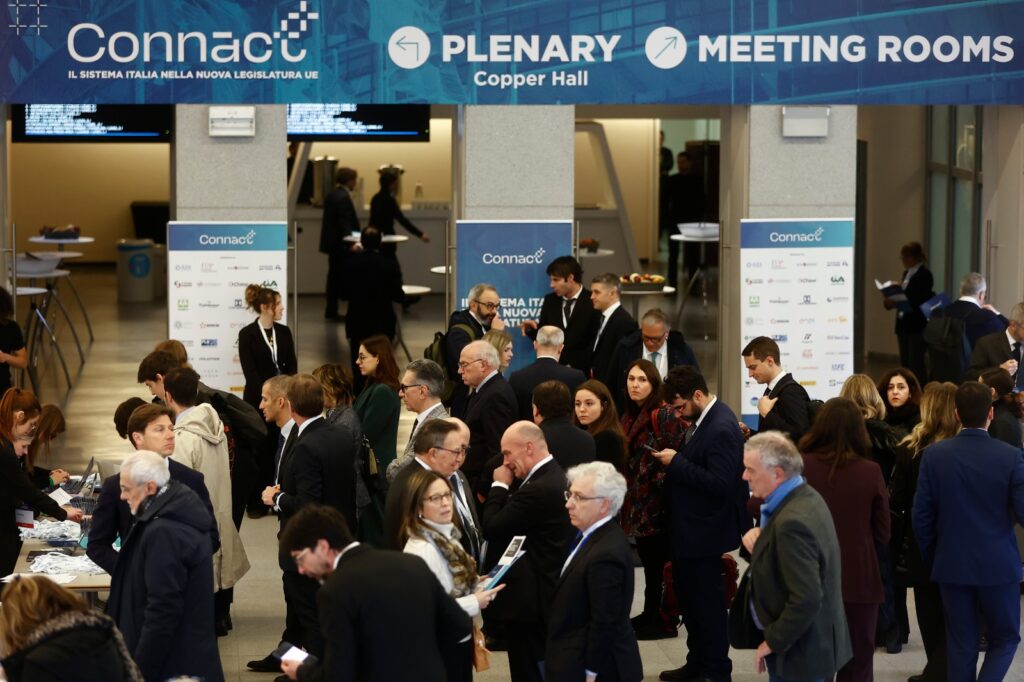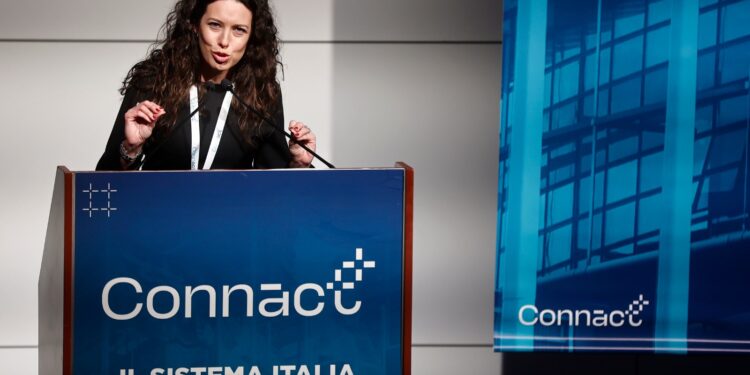Brussels – The ConnAct event, in which the Italian system presents itself to EU institutions in Brussels, kicks off this afternoon (Jan. 15). Twenty-two large companies and 12 trade associations for a turnover worth 47 per cent of Italian GDP are showcased in the European capital, protagonists of the first ConnAct annual meeting, the platform of events created to facilitate discussion between Italian and European private and institutional players through moments of meeting and networking.
With over 1 trillion in revenues, a representation of over one million businesses (20 per cent of those in Italy), and 4.6 million people employed (28 per cent of all private sector employees), the leading companies and associations will discuss with the Italian delegation of the European Parliament and officials from European institutions the priorities of the Italian system in Europe for the next five years.
In opening the plenary session, the moderators read the institutional greetings sent in writing by the presidents of the Chambers of the Italian Parliament. Starting with that of President of the Senate Ignazio La Russa. The member of Fratelli d’Italia praised the initiative, which can “build an important space for discussion and in-depth analysis on the future of Italy and Europe.”
“A strategic importance,” continues the message from the Republic’s second highest office, “which finds confirmation in the prestigious accolades, first and foremost that of the European Parliament, that distinguish this event and underscore its dual purpose.” Namely, “to create connections and synergies at every level, public and private, and to lay the groundwork so that decisions and projects can be quickly translated into actions and tangible results in the interest of citizens.”
In the same vein also spoke the President of the Chamber of Deputies, Lorenzo Fontana: “An important opportunity to stimulate a broad and shared reflection on issues that, because of their relevance, occupy a central position on the agenda of European and national policymakers” such as energy and digital transitions, economic and environmental sustainability, and security. “In this context,” the Leghist parliamentarian’s message continues, “the new European legislature represents a crucial opportunity for Italy to assert itself as a protagonist and to lead Europe on this common path.”
“It is essential that our country, the third largest economy in the EU, make its voice heard even more decisively, contributing actively to the definition of coherent policies,” Fontana argues, “while at the same time ensuring adequate protection of national interests.” This is why “it becomes indispensable to promote moments of confrontation and dialogue between institutions, business leaders and citizens called upon to cooperate in a climate of virtuous synergy.”

In attendance, however, Vice-President of the European Parliament Antonella Sberna, who called Italy’s political representation at EU institutions—that is, 76 MEPs and an executive vice-president of the European Commission, her party colleague Raffaele Fitto —an “instrument in the service of the country.”
The deputy from Fratelli d’Italia praised the “injection of seriousness and positivity” resulting from the diverse composition of the room, something that underscores the presence of “a common interest to protect our Italian system, to bring concrete and real results in a situation that we all recognize is complex.”
“Being all here today, focusing on the issues, and working on tables where parliamentarians, enterprises, and institutions will be present means giving concrete proof that the inputs that may come out of these tables are already shared,” Sberna remarked from the stage of the event, proving that “there is a solid and real discussion on the issues” regardless of the “ideology that each of us may bring forward with respect to our political affiliation.”
According to the vice-president of the EU Parliament, the European Union’s capital that serves as the setting for the ConnAct conference “is an important place where serious decisions can be made and the outcomes of the economic, social, and business activity of our companies can be positively affected.” It is crucial, Sberna concluded, “to understand what is good of our Italy embedded in a European system” because “our national interest must be strong in a Europe that, if it too becomes strong and competitive, gives us a chance to be a real checkerboard of confrontation with respect to the economic blocs” that are shaping the world, namely the United States and China.
English version by the Translation Service of Withub





